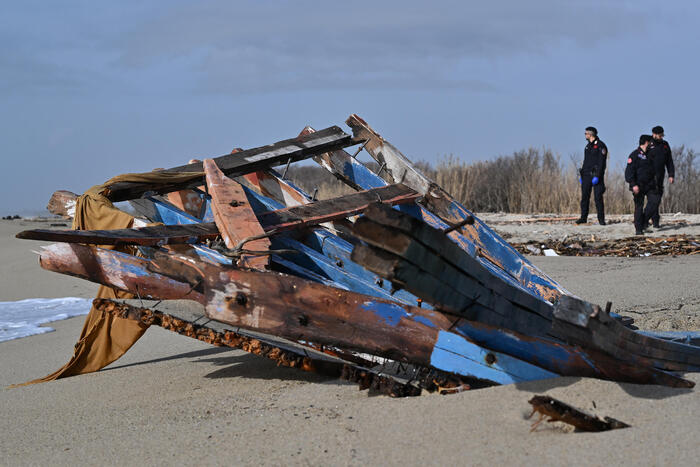Landsberg: Theater an der Ruhr shows "Germania"
Created: 10/28/2022 5:23 p.m
By: Susanne Greiner
The alien Germane as a blue-green little man: Bernhard Glose in "Germania".
© Greiner
Landsberg – “Language is not used to describe things, it is used to say things to one another.” What Roberto Ciulli says in conversation with the theater director Simone Derai of the Anagoor collective is a basic prerequisite for theatre.
Just like the actors need the audience, speakers need recipients – which is how they bring the misunderstanding into the house.
Because language is not isolated.
What you say depends on who says what to whom, and under what conditions.
And of the context in which the addressee is located.
That is why language, which connects, can also be a border.
In "Germania" the theater collective Anagoor and the Theater an der Ruhr dissect the language.
Your scalpel: language itself, of course.
Because what the viewer can expect is one and a half 'stagnant' hours.
In the sense that the actors – Roberto Ciulli, Bernhard Glose, Marco Menegoni and Simone Thoma – act almost immobile, only speaking.
Movements take place so slowly that they disappear.
Which does not detract from the pull that the piece exerts on the viewer.
Sequences are shown that illuminate language from different perspectives.
In the beginning stands Tacitus.
His report "Germania" from the first century AD states 'blue-green little men', the Germans across the Rhine seem so foreign, unable to build houses, living in caves, "a nightmare for Rome".
The text is spoken into the microphone in Italian by an actor and appears at the same time as text on illuminated panels hanging in the otherwise empty stage area.
Those who speak Italian experience the content directly, the others through the filter of reading - and feel how different a read content appears in contrast to a spoken one: what has been read makes the speaker disappear.
Another sequence at the end of the piece takes up different languages: when Arminius and his brother Flavus, Germans and Romans in one, tell their story, one tells it in Latin, the other in German.
However, Latin comes to life here as a spoken language, far away from the strict ablative and towards emotion - you almost don't need German to understand it.
The act of speaking always belongs to language.
The language cosmos also contains visual language: a 'silent film' illustrates Tacitus' report and lets what happened appear in a different light.
The next sequence: one of the 'green' Teutons tells Tacitus' report from his point of view: "We live deep in caves, that's enough for us", why should one build houses?
The foreign is drawing near and making what was previously close strange.
The exterior remains separating, represented by Derai in the costumes through clear coloring: the green, the red, the yellow.
Away from Tacitus towards Roberto Ciulli and his personal experience.
In another sequence, the 88-year-old sits in front of a microphone, chatting humorously about the Italian, who wonders what earnings have to do with appearance – "gross" means "ugly" in Italian.
Away from the anecdote towards the autobiography: Ciulli tells how his broken German was laughed at when he came to Germany at the age of 30.
He should rather sing, "preferably 'O sole mio'".
And as far as his theater work is concerned: "Stick to your Comedia dell'Arte." Ciulli's 'alien' gaze in particular is discovering new sides of the familiar.
What Ciulli wants: to found a country "in which being foreign is not a flaw, but quality".
This very personal address touches you – and yet remains part of the piece.
The dissection of language as a boundary is accompanied by distracting flickering lights, background noise, a thumping and scraping overlaying quiet words.
Because language can also become a limit simply by not being able to hear or not wanting to listen.
"Germania" opens up a huge field of topics, questions, refuses to answer.
The audience is rather clueless at the end.
"An experiment" is "Germania", without question, Ciulli admits in the follow-up discussion with the viewers.
Not concretely tangible, without a plot line, but immensely resonant and lasting.
After all, you have to think about the piece for a long time, says a viewer.
Ciulli replies, "That's the point."















